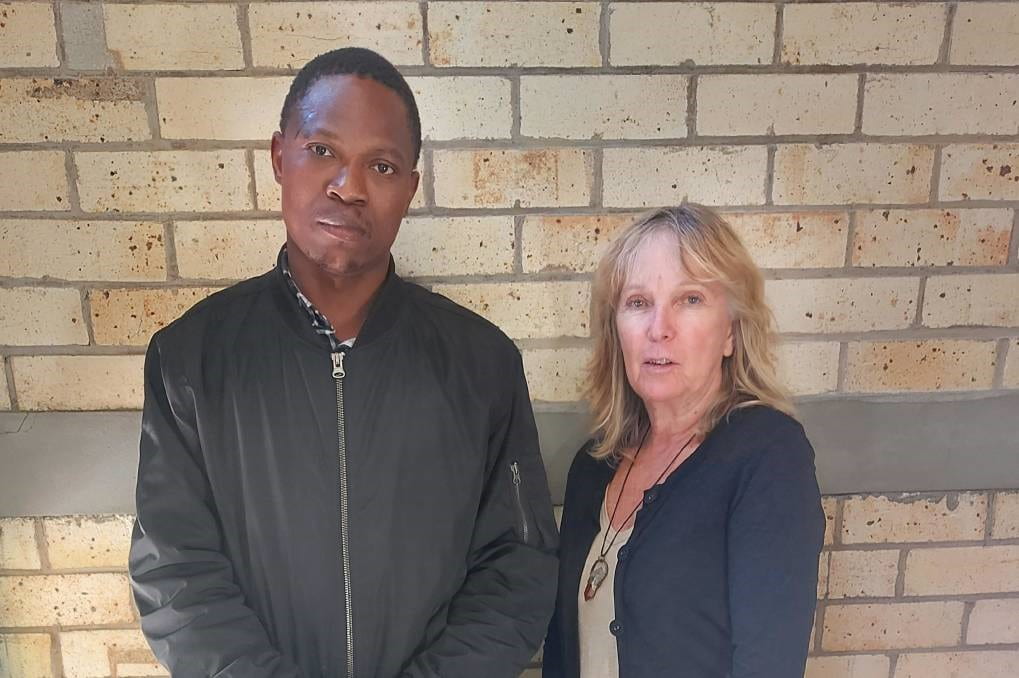Image: PhD student Godwin Yidana with Dr Johanna Garnett, supplied by UNE Peace Studies.
UNE Peace Studies Condemnation of Myanmar’s Military Coup and Concern Regarding the Destruction of Democracy, 20 April 2021
“The February 1, 2021 coup in Myanmar is an affront to democracy and an assault on peace, human rights and humanity. This tragic situation in Myanmar is of grave concern and heartbreaking to the Peace Studies Department in HASS, at UNE. As a department which trains individuals to work with groups and communities to explore nonviolent ways of transforming conflict and help conflict-affected communities to rebuild sustainable, just and equitable societies, we cannot be silent over such grave inhumane, cruel and brutal killings of civilians, who are generally waging nonviolent protest against the overthrow of democracy in Myanmar. For those of us who have lived and worked and continue to work in Myanmar, and have friends and colleagues who are either involved in the protest movement or have been arrested and detained or killed, this is a gut-wrenching period.”
“The brutal situation currently unfolding in Myanmar has been condemned globally. The UN has expressed concerns and many INGOs, particularly those working in Myanmar, have issued protest statements against the coup. The World Bank and The Asian Development Bank (ADB) have both partially suspended lending to Myanmar. It is significant to note that the biggest protest and challenge to the military junta so far have been by the people of Myanmar, particularly women and young people who, since February 1, continue to risk their lives and that of their families to defy the junta and call for a return to democracy. In response to this open defiance by the Civil Disobedience Movement (CDM) and other local groups, the junta have resorted to the brutal killings of protesters and arbitrary arrests, torture, detention and disappearance of political opponents. So far, the official estimates have put the number of civilians killed at over 700.”
“As a university, UNE has many international students, including a considerable cohort from Myanmar. While we continue to support these students and colleagues in Myanmar from a distance, we wish to add our voice to the global condemnation of the brutal, premeditated killings of protesters and their families. We, in solidarity with our Myanmar students and colleagues, wish to express our outrage against the State Administration Council junta and its military and police force, who continue to commit atrocities against civilians across the country. We urge them to immediately cease the killings and human rights violations. We also urge the Australian Government to take appropriate actions such as requiring the Future Fund to end its $3.2 million investment in Adani Ports, a corporation linked to a Myanmar military-controlled company that has just been slapped with sanctions by the United States over human rights violations. We urge the Australian Government to bring maximum pressure to bear on the SAC to halt all killings and human rights violations and work with all relevant stakeholders, including the international community, to find peaceful solutions to the crisis without further delay.”
“Justice and peace for Myanmar!”
– Godwin Yidana PhD Candidate, Dr Johanna Garnett and Dr Marty Branagan on behalf of Peace Studies, HASS, University of New England.
Dr Johanna Garnett, also recently published an research article with Peace Studies Masters student, Brooke Kingsford (who graduated last year). This article was an outcome of a HUMS507 project which Brooke did as part of her Master of Arts Majoring in Environmental Advocacy. The research article was peer reviewed with positive feedback arguing for its publication and noting how beneficial it is to publish student work (with academics), and how this should be a more common occurrence.
Dr Garnett and Brooke’s research article investigates food security vulnerability in Australia; specifically, exploring Australian’s attitudes toward food security during the COVID-19 pandemic and whether this global event prompted individuals to explore alternative food initiatives (AFIs). The qualitative research that informs the article was conducted through an online survey which had over 110 participants, many of whom experienced food supply issues due to COVID-19, prompting almost half of them to explore AFIs. The research also found that general apathy about the short-term future and climate change denial prevented others from exploring AFIs. Dr Garnett notes that this is concerning in light of climate change and the need to address potential food security issues in the future.
If you would like more information about anything presented in this article, please contact: jgarnet4@une.edu.au



Recent Comments